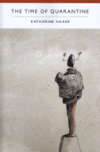The Time of Quarantine
With increasing frequency, well-meaning friends have been sending me articles that encourage me to stop worrying about the next generation and just have fun. It’s not that they think everything will turn out OK, but rather, that we’re so far gone, there’s nothing to be done. It seems that groups of climate scientists are predicting our demise with a specificity and immediacy that would make an old-timey cult leader blush. The Water Wars are coming: look busy.
With increasing frequency, well-meaning friends have been sending me articles that encourage me to stop worrying about the next generation and just have fun. It’s not that they think everything will turn out OK, but rather, that we’re so far gone, there’s nothing to be done. It seems that groups of climate scientists are predicting our demise with a specificity and immediacy that would make an old-timey cult leader blush. The Water Wars are coming: look busy.
It’s no surprise then, that in this polarized and rather hysterical national mood, stories about the end of days, of one man against a ruined world, hold particular resonance. The protagonist of Katharine Haake’s The Time of Quarantine, the sole survivor of an intentional community that sought to escape the world but was ravaged by disease, therefore faces a challenge the reader might have already imagined. Left on his own, will Peter follow his father’s rules, living safely among the hoarded rations and guarding the technology and culture passed on to him?
Shortly after my first read of Quarantine, I took a detour through What Our Speech Disrupts: Feminism and Creative Writing Theory. Like this earlier work of Haake’s, Quarantine seems less concerned with maintaining Peter’s received narrative of how the world actually got to this state than with what he has been instructed to forget:
What I want, your mother says, but you’re too young and tired now even to wonder why, is to be with my god and not worry about the far-off stuff, just get through the day and be grateful for its common beauties. All these people, I just want for them to be ok—to sleep and to dream like human beings to—all of them—the musicians and gardeners and mathematicians and teachers and seamstresses and fishers and storytellers and pharmacists and archaeologists and librarians and rodeo riders—to sleep and then to wake, just like you and me, in the light, with the birds and the music.
Well, your father doesn’t think so, but a day will come when we have to do what they do and die.
Memories of his mother, who was not willing to give up on the world even to be with her son, who fought against the marvelous technology his father implanted to suit Peter’s brain to the new environment, intrude. As he comes into adulthood, Peter seeks to understand the world with a fullness unavailable to either of his parents, gathering with him a group of like-minded misfits: a poet who viewed the world from the high-rise her parents got to protect her; a court reporter who, like Peter, is intrinsically and surgically adapted to the new world; and a mathematician who escapes from a Gilligan’s Island–like futurology seminar.
The reader seeking something solid to grasp onto may be disappointed in the piling up of constantly shifting perspectives and the long meandering poetry of Haake’s sentences. Lyda, the poet, as she sees the world shift before her, exclaims: “This is what language would look like if language had a body.” The reader is thrust into a world of people trying to understand that world, and their fragmentary vision is ours. Ultimately, Haake’s language is an expression of desire, of choosing, but not of naming, and the world of Quarantine rises to meet it. Reality is elusive, but what remains is the feeling of bodies “huddled hip-to-hip, on the concrete floor . . . exchanging confidences. . . . Keep talking, Lyda thinks, Oh keep talking.”





